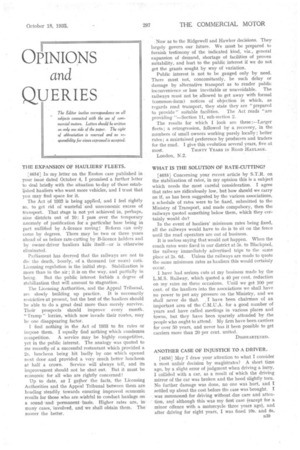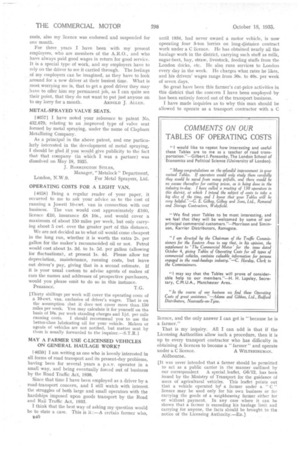NINIONS
Page 53

Page 54

If you've noticed an error in this article please click here to report it so we can fix it.
and
QUERIES
THE EXPANSION OF HAULIERS' FLEETS.
[4654] In my letter on the Enston case published in your issue dated October 4, I promised a further letter to deal briefly with the situation to-day of those established hauliers who want more vehicles, and I trust that you may find space for it.
The Act Of 1933 is being applied, and I feel rightly so, to get rid of wasteful and .uneconomic excess of transport. That stage is not yet achieved in, perhaps, nine districts out of 10: I pass over the temporary anomaly of justification for a particular base being in part nullified by A-licence roving! Reform can only come by degrees. There may be two or three years ahead of us before rate-cutting by B-licence holders and by owner-driver hauliers kills itself—or is otherwise eliminated.
Parliament has decreed that the railways are not to die the death, hourly, of a thousand (or more) cuts. Licensing regulation is the initial step. Stabilization is more than in the air; it is on the way, and partially in being. 13ut the public interest forbids a degree of stabilization that will amount to stagnation.
The Licensing Authorities, and the Appeal Tribunal, are slowly building up practice. It is necessarily restrictive at present, but the best of the hauliers should be able to do a great deal more than merely survive. Their prospects should improve every month. " Tramp " lorries, which now invade their routes, may be one disappearing factor.
I find nothing in the Act of 1933 to fix rates or impose them. I equally find nothing which condemns competition. A service may be highly competitive, yet in the public interest. The analogy was quoted to me recently. of a successful restaurant which provided a 2s. luncheon being hit badly by one which opened next door and provided a very much better luncheon at half a crown. Service will always tell, and its improvement should not be shut out. But it must be economic for all who are rightly concerned!
Up to date, as I gather the facts, the Licensing Authorities and the Appeal Tribunal between them are heading steadily towards ensuring improved economic results for those who are wishful to conduct haulage on a sound and pertnanenU basis. Higher rates are, in manSr cases, involved, and• we shall obtain them. The sooner the better. Now as to the Ridgewell and Hawker decisions. They largely govern our future. We Must be prepared to furnish testimony of the indicated kind, viz., general expansion of demand, shortage of facilities of proven suitability, and hurt to the public interest if we do not get the grants sought by way of variation.
Public interest is not to be gauged only by need. There must not, concomitantly, be such delay or damage by alternative transport as to render public inconvenience or loss inevitable or unavoidable. The railways must not be allowed to get away with formal (common-form) notices of objection in which, as regards road transport, they state they are "prepared to provide" suitable facilities. The Act reads "are providing "—Section 11, sub-section 2.
The results for which I look are these :—Larger fleets; a retrogression, followed by a recovery, in the numbers of small owners working purely locally ; better rates; a maintained preference by producers and traders for the road. I give this evolution several years, five at most. THIRTY YEARS IN ROAD HAULAGE. London, N.2.
WHAT IS THE SOLUTION OF RATE-CUTTING?
[4655] Concerning your recent article by S.T.R. on the stabilization of rates, in my opinion this is a subject which needs the most careful consideration. I agree that rates are ridiculously low, but how should we carry on if, as has been suggested by the various associations, a schedule of rates were to be fixed, submitted to the Ministry of Transport, and made compulsory, then the railways quoted something below them, which they certhinly would do?
In the event of hauliers' minimum rates being fixed, all the railways would have to do is to sit on the fence until the road operators are out of business.
It is useless saying that would not happen. When the coach rates were fixed in our district at 5s. to Blackpool, the railway immediately advertised trips to the same place at 2s. 6d. Unless the railways are made to quote the same minimum rates as hauliers this would certainly occur.
I have had serious cuts at my business made by the L.M.S. Railway, which quoted a 40 per cent, reduction on my rates on three occasions. Until we get 100 per cent, of the hauliers into the associations we shall have no power to put any pressure on the Ministry, and we shall never do that. , I have been chairman of an important area of the C.M.LT.A. for a good number of years and have called meetings in various places and towns, but they have been sparsely attended by the people who ought to attend. My firm have been carriers for over 50 years, and never has it been possible to get carriers more than 20 per cent. united.
DISHEARTENED.
ANOTHER CASE OF INJUSTICE TO A DRIVER.
[4656] May I draw your attention to what I consider a most unfair decision by magistrates? A short time ago, by a slight error of judgment when driving a lorry, I collided with a car, as a result of which the driving mirror of the car was broken and the hood slightly torn. No further damage was done, no one was hurt, and I settled up about the cost before the case was brought. I was summoned for driving without due care and attention, an,d although this was my first case (except for a minor offence with a motorcycle three years ago), and after driving for eight years, I was fined 10s. and Ss. costs, also my licence was endorsed and suspended for one month.
For three years I have been with my present employers, who are members of the A.R.O., and who have always paid good wages in return-for good service. It is a special type of work, and my employers have to rely on the driver to see it carried through. The feelings of my employers can be imagined, as they have to look around for a new driver at their busiest time. What is most worrying me is, that to get a good driver they may have to offer him my permanent job, as I can quite see their point, that they do not want to put just anyone on
to my lorry for a month. ARNOLD J. ALLEN.
METAL-SPRAYED VALVE SEATS.
[46571 I have noted your reference to patent No. 432,679, relating to an improved type of valve seat formed by metal spraying, under the name of Clapham Metallizing Company.
As a principal in the above patent, and one particularly interested in the development of metal spraying, I should be glad if you would _give publicity to the fact that that company (in which I was a partner) was dissolved on May 18, 1935.
J. BARRINGTON SITLES, Manager, "Metalock " Department, London, N.W.9. For Metal Sprayers, Ltd.
OPERATING COSTS FOR A LIGHT VAN.
[46581 Being a regular reader of your paper, it occurred to me to ask your advice as to the cost of running a Jovvett 10-cwt. van in connection with our business. The van would cost approximately £160, licence £10, insurance £8 10s., and would cover a maximum of about 150 miles per week, but only carrying about 5 cwt. over the greater part of this distance.
We are not decided as to what oil would come cheapest in the long run, whether it is worth the extra 2s. per gallon for the maker's recominefided oil or not. Petrol would cost about 1s. 3d. to 1s. 5d. per gallon (allowing for fluctuations), at present 1s. 4d. Please allow for depreciation, maintenance, running costs, but leave out driver's pay, giving that in a second estimate. If it is your usual custom to advise agents of makes of cars the names and addresses of prospective purchasers, would you please omit to do so in this instance.
Penzance. T.G.
[Thirty shillings per week will cover the operating costs of a 10-cwt. van, exclusive of driver's wages. That is on the assumption that it does .not cover more than .150 miles per week. You may calculate it for yourself on the basis of 10s. per week standing charges and 13d. per mile running costs, I should recommend you to use the better-class lubricating oil for your vehicle. Makers or agents of vehicles are not notified, but matter sent by them is usually forwarded to the inquirer.—S.T.R.]
MAY A FARMER USE C-LICENSED VEHICLES ON GENERAL HAULAGE WORK?
[4659] I am writing as one who is keenly interested in all forms of road transport and its present-day problems, having been for several years a p.s.v. operator in a small way, and being eventually forced out of business by the Road Traffic Act, 1930.
Since that time I have been employed as a driver by a road-transport concern, and I still watch with interest the struggles of both large and small operators with the hardships imposed upon goods transport by the Road and Rail Traffic Act, 1933.
I think that the best way of asking my question would be to state a case. This is it —A certain farmer who, 840 until 1934, had never owned a motor vehicle, is now operating four 3-ton lorries on long-distance contract work under a C licence. He has obtained nearly all the haulage work in the district, carrying such stuff as milk, sugardpeet, hay, straw, livestock, feeding stuffs from the London docks, etc. He also runs services to London every day in the week. He charges what rates he likes, and his drivers' wages range from 30s. to 40s. per week of seven days.
So great have been this farmer's cut-price activities in this district that the concern I have been employed by has been entirely forced out of the transport business.
I have made inquiries as to why this man should be allowed to operate as a transport contractor with a C licence, and the only answer I can get is " because he is a farmer."
That is my inquiry. All I can add is that if the Licensing Authorities allow Such a procedure, then it is up to every transport contractor who has difficulty in obtaining A licences to become a " fanner " and operate
under a C licence. A WILTSHIREMAN. Aldbourne.
[It was never intended that a farmer should be permitted to act as a public carrier in the manner outlined by our correspondent A special_leatlet, G6/12, has been issued by the Ministry of Transport for the guidance of users of agricultural vehicles. This leaflet points out that a vehicle operated by' a farmer under a " C "
• licence may be used only for his own business or for carrying the goods of a neighbouring farmer either for or without payment. In any case where it can be shown that a farmer is exceeding his haulage limit and carrying for anyone, the facts should be brought to the notice of the Licensing Authority.—En.)




























































































